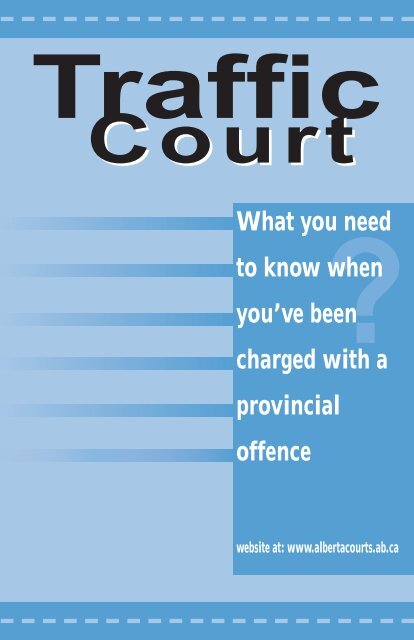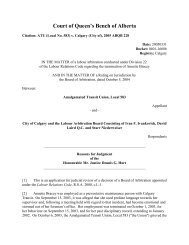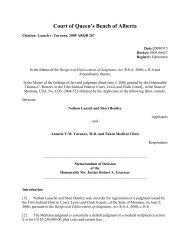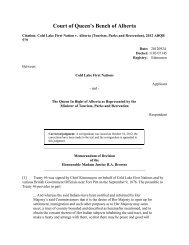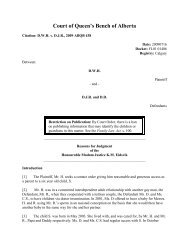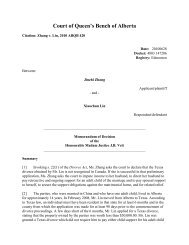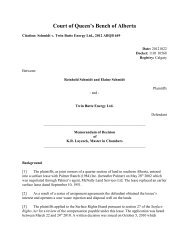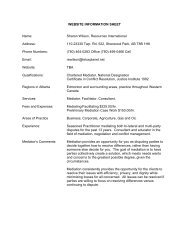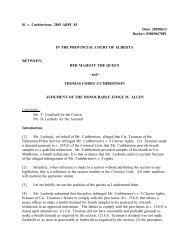What you need to know when you've been charged ... - Alberta Courts
What you need to know when you've been charged ... - Alberta Courts
What you need to know when you've been charged ... - Alberta Courts
Create successful ePaper yourself
Turn your PDF publications into a flip-book with our unique Google optimized e-Paper software.
Traffi c<br />
Court<br />
<strong>What</strong> <strong>you</strong> <strong>need</strong><br />
?<br />
<strong>to</strong> <strong>know</strong> <strong>when</strong><br />
<strong>you</strong>’ve <strong>been</strong><br />
<strong>charged</strong> with a<br />
provincial<br />
offence<br />
website at: www.albertacourts.ab.ca
Table of Contents<br />
1. You Have Been Charged With an Offence. Now <strong>What</strong>? ----------------1<br />
1a. Summons Violation Tickets (pink) -------------------------------------2<br />
1b. Offence Notice Violation Tickets (yellow or white) --------------2<br />
2. Do You Need an Interpreter? ------------------------------------------------------3<br />
3. Lawyers and Agents -------------------------------------------------------------------3<br />
4. How Do You Get a Lawyer or Agent? -----------------------------------------3<br />
5a. Legal Aid ----------------------------------------------------------------------------------4<br />
5b. <strong>Alberta</strong> Law Line (a program of Legal Aid of <strong>Alberta</strong>) -----------------4<br />
6. Other Services ---------------------------------------------------------------------------5<br />
6a. Student Legal Assistance - Edmon<strong>to</strong>n ---------------------------------5<br />
6b. Student Legal Assistance - Calgary -------------------------------------5<br />
6c. Calgary Legal Guidance ----------------------------------------------------5<br />
6d. Dial-A-Law ----------------------------------------------------------------------6<br />
6e. Native Counselling Services of <strong>Alberta</strong> -------------------------------6<br />
7. Your First Court Appearance ------------------------------------------------------6<br />
7a. <strong>What</strong> if <strong>you</strong> cannot attend court on the appearance date? -----7<br />
7b. Transfer of charges <strong>to</strong> another court location for guilty plea -7<br />
8. If You Plead Not Guilty -------------------------------------------------------------8<br />
9. If You are Thinking of Pleading Guilty----------------------------------------8<br />
10. Where and When Will the Trial Be? --------------------------------------------9<br />
11. Getting Ready for Trial When You have Pled Not Guilty ------------10<br />
11a. Find out what evidence there is against <strong>you</strong> ----------------------10<br />
11b. Preparing <strong>you</strong>r defence ----------------------------------------------------10<br />
11c. Bring <strong>you</strong>r witnesses <strong>to</strong> court -------------------------------------------11<br />
12. <strong>What</strong> Happens at Trial? ------------------------------------------------------------11<br />
13. Sentencing ------------------------------------------------------------------------------12<br />
14. Victims of Crime Surcharge on Offenders ----------------------------------13<br />
This booklet provides general information about proceedings in Traffic Court. For<br />
legal advice and advice on possible defence strategies relating <strong>to</strong> the charges against<br />
<strong>you</strong>, <strong>you</strong> should consult a lawyer.
Traffic Court is part of the Provincial Court of <strong>Alberta</strong>. It deals with<br />
offences (commonly referred <strong>to</strong> as provincial offences) under provincial<br />
statutes such as the Traffic Safety Act and Regulations under this Act,<br />
municipal by-laws and a few federal statutes. Traffic Court does not deal<br />
with charges under most federal statutes, including the Criminal Code.<br />
Trials in Traffic Court are generally heard by a sitting justice of the<br />
peace (usually referred <strong>to</strong> as a Traffic Commissioner). However, Provincial<br />
Court judges hear trials at some locations in the province. A Provincial<br />
Court judge should be addressed in court as Your Honour, and a Traffic<br />
Commissioner, as Your Worship.<br />
1You Have Been Charged With an Offence.<br />
Now what?<br />
If <strong>you</strong> are <strong>charged</strong> with a provincial offence, the peace<br />
officer will give <strong>you</strong> one of the following documents:<br />
violation ticket<br />
summons <strong>to</strong> a person <strong>charged</strong> with an offence<br />
appearance notice<br />
In most cases the peace officer will give <strong>you</strong> a violation<br />
ticket, which will tell <strong>you</strong><br />
what <strong>you</strong> have <strong>been</strong> <strong>charged</strong> with<br />
the date and time <strong>you</strong> are required <strong>to</strong> attend court<br />
the court’s address.<br />
It is very important that <strong>you</strong> carefully read the front and<br />
back of the violation ticket.<br />
Unless <strong>you</strong> are otherwise directed, all <strong>you</strong>r court<br />
appearances will be at the court location indicated on the<br />
violation ticket. You should also direct any correspondence<br />
or telephone calls <strong>to</strong> this court location.<br />
There are two types of violation tickets:<br />
violation tickets that contain a summons<br />
(summons violation ticket)<br />
1
2<br />
violation tickets that contain an offence notice<br />
(offence notice violation ticket)<br />
Each ticket type uses different procedures, which are<br />
described below.<br />
1a Summons Violation Tickets (pink)<br />
Your copy of a summons violation ticket will be pink and it<br />
will have the words “Part 2, Summons” in the upper right<br />
hand corner.<br />
If the officer has marked the “Court Appearance Required”<br />
box, <strong>you</strong> must appear in court (in person or by agent) on or<br />
before the date specified in the ticket. If <strong>you</strong> do not appear<br />
in court as required, a warrant for <strong>you</strong>r arrest may be issued.<br />
If the officer has marked the “Voluntary Payment Option”<br />
box with a fine amount, <strong>you</strong> have the option of paying the<br />
specified voluntary payment amount in full or appearing in<br />
court (in person or by agent) on or before the date set out<br />
in the ticket. By paying the voluntary payment amount <strong>you</strong><br />
are deemed <strong>to</strong> have pled guilty <strong>to</strong> the charge. If <strong>you</strong> do not<br />
pay the voluntary payment amount and <strong>you</strong> do not appear<br />
in court <strong>when</strong> required <strong>to</strong> do so, a warrant for <strong>you</strong>r arrest<br />
may be issued.<br />
1b Offence Notice Violation Tickets (yellow or white)<br />
Your copy of an offence notice violation ticket will be<br />
yellow or white and it will have the words “Part 3, Offence<br />
Notice” in the upper right hand corner.<br />
Read both sides of the ticket carefully. The back provides<br />
detailed information on <strong>you</strong>r options.<br />
If <strong>you</strong> fail <strong>to</strong> respond <strong>to</strong> an offence notice violation ticket<br />
on or before the date set out on the front of the ticket, <strong>you</strong><br />
may be convicted in <strong>you</strong>r absence. The amount set out on<br />
the front of the ticket (the Voluntary Payment Option) will<br />
be assessed as <strong>you</strong>r fine. The fine and any applicable late<br />
payment charge will be recorded at the Mo<strong>to</strong>r Vehicle<br />
Registry and <strong>you</strong> will be mailed a Notice of Conviction. The<br />
Mo<strong>to</strong>r Vehicle Registry may not provide <strong>you</strong> with services<br />
until <strong>you</strong> pay all fines in full. An accumulation of unpaid<br />
fines may result in the suspension of <strong>you</strong>r opera<strong>to</strong>r’s licence.
2Do You Need an Interpreter?<br />
3Lawyers and Agents<br />
If <strong>you</strong> or <strong>you</strong>r witnesses are not fluent in English, <strong>you</strong><br />
can request an interpreter. The court will then appoint<br />
an interpreter (at no cost <strong>to</strong> <strong>you</strong>) <strong>to</strong> assist <strong>you</strong> in all<br />
proceedings before the court.<br />
You may appear in Traffic Court in person or have an<br />
agent* appear on <strong>you</strong>r behalf. If <strong>you</strong> want a lawyer or paid<br />
agent <strong>to</strong> represent <strong>you</strong>, <strong>you</strong> should arrange for one as soon<br />
as possible, preferably before <strong>you</strong> enter a plea <strong>to</strong> the charge<br />
or set a date for trial. The lawyer or agent will <strong>need</strong> time<br />
<strong>to</strong> prepare <strong>you</strong>r case. If <strong>you</strong> do not have a lawyer or agent<br />
on the day set for the trial, the Traffic Commissioner might<br />
not grant <strong>you</strong> an adjournment <strong>to</strong> get one, and might require<br />
<strong>you</strong> <strong>to</strong> represent <strong>you</strong>rself.<br />
*An agent is someone whom <strong>you</strong> authorize <strong>to</strong><br />
represent <strong>you</strong> in court. An agent might be a friend,<br />
relative or associate or might be a lawyer or a nonlawyer<br />
who represents individuals in court for a fee.<br />
Paid agents who are not lawyers are not allowed <strong>to</strong><br />
represent persons in some court locations in <strong>Alberta</strong>.<br />
4How Do You Get a Lawyer or Agent?<br />
Look through the Yellow Pages under “Lawyers” and call a<br />
lawyer who is listed as practicing criminal law or practicing<br />
in traffic court. Or call the Lawyer Referral Service and ask<br />
for the name of a lawyer who practices in Traffic Court.<br />
The province-wide phone number for the Lawyer Referral<br />
Service is 1-800-661-1095. If <strong>you</strong> are in Calgary, the<br />
number is 403-228-1722. Lawyer Referral Service will give<br />
<strong>you</strong> the names of three lawyers who deal with this area of<br />
the law. You can make an appointment with any or all of<br />
the three lawyers. There is no charge for the first half-hour<br />
interview with one of these lawyers, after which <strong>you</strong> can<br />
decide whether <strong>you</strong> want <strong>to</strong> hire that lawyer <strong>to</strong> represent<br />
<strong>you</strong>. You should discuss fees.<br />
3
4<br />
5aLegal Aid<br />
For paid agents, look in the yellow pages under paralegal<br />
services, court agents, traffic law representation or traffic<br />
ticket agents.<br />
If <strong>you</strong> cannot afford a lawyer or paid agent, there may be<br />
other services that can assist <strong>you</strong>.<br />
If <strong>you</strong> cannot afford a lawyer, call the nearest Legal Aid<br />
office (listed in both the White pages and Yellow pages<br />
direc<strong>to</strong>ries) <strong>to</strong> see if they can help <strong>you</strong>. You can also<br />
contact us at www.legalaid.ab.ca under “Contact Us”.<br />
Legal Aid does not normally cover provincial offences,<br />
but may consider making an exception <strong>when</strong> there is the<br />
likelihood of a jail sentence or job loss associated with a<br />
conviction.<br />
Legal Aid is not free. You will be asked <strong>to</strong> pay back the cost<br />
<strong>when</strong> <strong>you</strong> are able <strong>to</strong>.<br />
When <strong>you</strong> apply <strong>to</strong> Legal Aid, <strong>you</strong> must give financial<br />
information so that they can determine whether <strong>you</strong> are<br />
eligible. Your eligibility depends both on <strong>you</strong>r financial<br />
situation and on the type of legal problem <strong>you</strong> have.<br />
If Legal Aid cannot assist <strong>you</strong>, they may suggest other<br />
agencies or services that might be able <strong>to</strong> help.<br />
5b <strong>Alberta</strong> Law Line (a program of Legal Aid of <strong>Alberta</strong>)<br />
A program of Legal Aid <strong>Alberta</strong>, <strong>Alberta</strong> Law Line<br />
provides free legal services <strong>to</strong> <strong>Alberta</strong> residents and <strong>to</strong><br />
other people with legal issues in <strong>Alberta</strong>. These services are<br />
by telephone only. The Law Line provides detailed legal<br />
information <strong>to</strong> callers and can provide free legal advice<br />
<strong>to</strong> callers who qualify for advice. The Law Line can be<br />
reached <strong>to</strong>ll free at 1-866-845-3425.
6aStudent<br />
Legal Assistance Edmon<strong>to</strong>n<br />
Other Services<br />
Student Legal Assistance of Edmon<strong>to</strong>n can give legal<br />
information and may assist low-income people in Provincial<br />
Court with a number of criminal charges, including breach<br />
of probation, certain driving offences, common assault,<br />
impaired driving and certain provincial offences. They<br />
will not assist persons <strong>charged</strong> with traffic violations with<br />
specified penalties (Voluntary Payment Option). Their<br />
hours of operation change during the school term. You can<br />
phone them at 780-492-2226 for further information.<br />
6bStudent Legal Assistance Calgary<br />
Student Legal Assistance (SLA) is a non-profit charity<br />
that, through law students at the University of Calgary,<br />
provides free year-round legal assistance and representation<br />
<strong>to</strong> low-income people in the Calgary area. They work with<br />
summary conviction matters under the Traffic Safety Act<br />
and Regulations under this Act in Provincial Court Traffic,<br />
including speeding, driving without insurance, driving<br />
without due care and attention (careless driving), etc. If<br />
SLA is able <strong>to</strong> assist, a $30.00 disbursement charge is levied.<br />
Their phone number is 403-220-6637.<br />
6cCalgary Legal Guidance<br />
Calgary Legal Guidance is a non-profit organization and<br />
runs a free evening legal clinic staffed by volunteer lawyers<br />
<strong>to</strong> provide information and advice on a wide range of legal<br />
matters. Staff lawyers and law students (<strong>when</strong> appropriate<br />
and on a case by case basis) sometimes provide further<br />
assistance. To attend a free evening legal advice clinic, <strong>you</strong><br />
must pre-book an appointment at 403-234-9266. If Calgary<br />
Legal Guidance staff provide further help, <strong>you</strong> will be<br />
<strong>charged</strong> a $50.00 fee.<br />
Please Note: Unless there are exceptional circumstances,<br />
Calgary Legal Guidance does not represent people in<br />
Traffic Court, and they refer these matters <strong>to</strong> Student Legal<br />
Assistance.<br />
5
6<br />
6d Dial-A-Law<br />
Dial-a-Law is a service <strong>you</strong> phone <strong>to</strong> listen <strong>to</strong> pre-recorded<br />
tapes containing general legal information, including<br />
information about Traffic Court matters. There is no charge<br />
<strong>to</strong> listen <strong>to</strong> a tape; <strong>you</strong> can obtain a transcript of a tape for<br />
$2. The phone number is 1-800-332-1091 or in Calgary,<br />
403-234-9022 or 403-228-1722.<br />
6e Native Counselling Services Of <strong>Alberta</strong><br />
Native Counselling works <strong>to</strong> ensure that Native people<br />
receive fair and equitable treatment in the justice system.<br />
Their Native Courtworker Program provides Aboriginal<br />
people with information about court procedures, their<br />
rights and responsibilities under the law, and advocacy,<br />
support and referrals <strong>to</strong> Legal Aid and other resources.<br />
Courtworkers also may attend court with their clients.<br />
Native Counselling Services of <strong>Alberta</strong>:<br />
Edmon<strong>to</strong>n 780-451-4002 • Calgary 403-237-7850<br />
www.ncsa.ca<br />
7 Your First Court Appearance<br />
Your first court appearance date and time is specified<br />
on the front of the violation ticket. If the peace officer<br />
checked a box that indicates that <strong>you</strong> must appear between<br />
9:00 a.m. and 3:30 p.m., <strong>you</strong> must appear between those<br />
times. If a particular time, such as 9:30 a.m. or 2:00 p.m. is<br />
specified, <strong>you</strong> must appear at that time.<br />
In Calgary and Edmon<strong>to</strong>n, <strong>you</strong> attend the “Justice of the<br />
Peace” counter <strong>to</strong> enter <strong>you</strong>r plea. In other locations, <strong>you</strong><br />
may be required <strong>to</strong> go in<strong>to</strong> the courtroom. The charge<br />
against <strong>you</strong> will be read out. You will be asked if <strong>you</strong> plead<br />
guilty or not guilty. Before entering a plea of guilty or not<br />
guilty <strong>you</strong> may ask <strong>to</strong> reserve <strong>you</strong>r plea. If <strong>you</strong> do not fully<br />
understand the charge against <strong>you</strong>, this will give <strong>you</strong> time<br />
<strong>to</strong> get additional information or legal advice. If <strong>you</strong> do not<br />
have a lawyer or agent, reserving <strong>you</strong>r plea will give <strong>you</strong><br />
time <strong>to</strong> talk <strong>to</strong> one. If <strong>you</strong> reserve <strong>you</strong>r plea, <strong>you</strong> will be<br />
given another date <strong>to</strong> return <strong>to</strong> court.
First Appearance Centres<br />
<strong>Alberta</strong> Justice operates First Appearance Centres at Traffic Court in<br />
various locations in the province. Provincial Crown prosecu<strong>to</strong>rs at these<br />
offices are available <strong>to</strong> speak <strong>to</strong> persons <strong>charged</strong> with an offence within that<br />
Court location. No appointment is necessary.<br />
If <strong>you</strong> believe there are extenuating circumstances that should be considered<br />
or simply wish <strong>to</strong> obtain general information regarding the charge against<br />
<strong>you</strong>, <strong>you</strong> can speak <strong>to</strong> one of the prosecu<strong>to</strong>rs at the First Appearance<br />
Centre. They have the authority <strong>to</strong> review and deal with the matter.<br />
The Calgary office is open from 7:30 a.m. <strong>to</strong> 12:30 p.m.; the Edmon<strong>to</strong>n<br />
office is open from 8:30 a.m. <strong>to</strong> 3:00 p.m. Contact the Court location listed<br />
on the violation ticket for similar services in other communities.<br />
7a<strong>What</strong> if <strong>you</strong> cannot attend court on the<br />
appearance date?<br />
If <strong>you</strong> are unable <strong>to</strong> attend court on the appearance date,<br />
<strong>you</strong> may do the following:<br />
You can arrange <strong>to</strong> have a lawyer or an agent appear<br />
for <strong>you</strong>.<br />
Offence notice violation tickets have a mail-in option<br />
available (see the back of the violation ticket for further<br />
instructions or options)<br />
You may go <strong>to</strong> the court before the specified<br />
appearance date. The clerk at the counter may be able<br />
<strong>to</strong> deal with <strong>you</strong>r ticket right away or give <strong>you</strong> a new<br />
date <strong>to</strong> appear.<br />
7bTransfer of charges <strong>to</strong> another court location for<br />
guilty plea<br />
If the officer gave <strong>you</strong> a summons violation ticket and<br />
<strong>you</strong> intend <strong>to</strong> plead guilty (see “If You are Thinking of<br />
Pleading Guilty”), <strong>you</strong> may request <strong>to</strong> have the charge<br />
transferred (waived) from the Traffic Court location shown<br />
on the violation ticket <strong>to</strong> a location that is more convenient<br />
7
8<br />
for <strong>you</strong>. For example, if <strong>you</strong> were <strong>charged</strong> in Lethbridge<br />
and live in Red Deer, <strong>you</strong> may be able <strong>to</strong> have the charge<br />
waived <strong>to</strong> Traffic Court in Red Deer for a plea of guilty.<br />
If <strong>you</strong> want a charge transferred from one Traffic Court<br />
location <strong>to</strong> another for a guilty plea, see the counter clerk<br />
at the Traffic Court location <strong>to</strong> which <strong>you</strong> want the charge<br />
transferred. You will be asked <strong>to</strong> sign a request for waiver<br />
form. You should do this well before <strong>you</strong>r next appearance<br />
date, because it will take several days for <strong>you</strong>r request <strong>to</strong><br />
be processed and documents <strong>to</strong> be transferred. A Crown<br />
prosecu<strong>to</strong>r must approve the request for waiver.<br />
It is not normally possible <strong>to</strong> transfer the charge <strong>to</strong> a<br />
different court location if <strong>you</strong> intend <strong>to</strong> plead not guilty.<br />
When <strong>you</strong> plead not guilty, the trial must normally be held<br />
at the location shown on the violation ticket.<br />
<strong>What</strong> is a Crown prosecu<strong>to</strong>r?<br />
In court proceedings in Canada the government is usually referred <strong>to</strong> as<br />
the Crown, so the person who puts forward the government’s case is often<br />
referred <strong>to</strong> as a Crown prosecu<strong>to</strong>r.<br />
8If You Plead Not Guilty<br />
If <strong>you</strong> plead not guilty, a trial will be scheduled. See<br />
“Where and When Will the Trial Be?”, “Getting Ready For<br />
Trial When You Have Pled Not Guilty”, “<strong>What</strong> Happens at<br />
Trial?” and “Sentencing” for information about <strong>you</strong>r trial.<br />
9If You are Thinking of Pleading Guilty<br />
Find out the possible consequences of a conviction before<br />
<strong>you</strong> plead guilty. <strong>What</strong> is the maximum fine? Is there<br />
a possibility of being sent <strong>to</strong> jail? Is there a minimum<br />
fine? Will <strong>you</strong> get demerits? Will a conviction affect <strong>you</strong>r<br />
insurance rates? Are there any consequences that <strong>you</strong> may<br />
be unaware of? You should consider seeking legal advice<br />
prior <strong>to</strong> entering a guilty plea, particularly in serious cases.
If <strong>you</strong> plead guilty, several things will happen. Once the<br />
guilty plea is entered, the prosecu<strong>to</strong>r will tell the Traffic<br />
Commissioner about the offence, often reading from the<br />
police report. Make sure the facts the prosecu<strong>to</strong>r presents<br />
are correct, since <strong>you</strong> will be asked if <strong>you</strong> agree <strong>to</strong> these<br />
facts. If <strong>you</strong> do not agree with something that is said, <strong>you</strong><br />
will have a chance <strong>to</strong> tell the Traffic Commissioner why<br />
<strong>you</strong> disagree. You cannot plead guilty unless <strong>you</strong> agree that<br />
<strong>you</strong> committed the offence. If <strong>you</strong> disagree with many of<br />
the facts, <strong>you</strong> should plead not guilty.<br />
If <strong>you</strong> have a record of prior convictions, the prosecu<strong>to</strong>r<br />
should show <strong>you</strong> a copy of the record before showing it<br />
<strong>to</strong> the Traffic Commissioner. Make sure it is <strong>you</strong>r record<br />
and that there aren’t any mistakes in it. If there are any<br />
mistakes, tell the Traffic Commissioner.<br />
See “Sentencing” for more information.<br />
10<br />
Where and When Will the Trial be?<br />
The violation ticket contains the address for the courthouse.<br />
When <strong>you</strong> plead not guilty, <strong>you</strong> will be advised of the trial<br />
date and the number of the courtroom where the trial will<br />
be heard. On the trial date, arrive at least 15 minutes early<br />
and look at the appearance list outside the courtroom. Let<br />
the Crown prosecu<strong>to</strong>r <strong>know</strong> <strong>you</strong> are there. The prosecu<strong>to</strong>r<br />
can usually be found sitting at one of the tables in the front<br />
of the courtroom.<br />
If proceedings were commenced by a summons violation<br />
ticket and <strong>you</strong> are late or do not attend for trial,<br />
the court may issue a warrant for <strong>you</strong>r arrest and <strong>you</strong><br />
can be <strong>charged</strong> under the Provincial Offences Procedure<br />
Act with the offence of failing <strong>to</strong> appear, or<br />
the trial may be held in <strong>you</strong>r absence.<br />
If the proceedings were commenced by an offence notice<br />
violation ticket, and <strong>you</strong> are late or do not attend for trial,<br />
<strong>you</strong> may be convicted in <strong>you</strong>r absence.<br />
9
10<br />
11<br />
Getting Ready For Trial When <strong>you</strong> Have Pled<br />
Not Guilty<br />
If <strong>you</strong> entered a plea of not guilty at <strong>you</strong>r first appearance<br />
and <strong>you</strong> want <strong>to</strong> change it <strong>to</strong> guilty at the trial date, <strong>you</strong><br />
must tell the Traffic Commissioner that <strong>you</strong> wish <strong>to</strong> change<br />
<strong>you</strong>r plea <strong>to</strong> guilty. If <strong>you</strong> <strong>know</strong> before the trial date that<br />
<strong>you</strong> want <strong>to</strong> plead guilty, <strong>you</strong> should go <strong>to</strong> Traffic Court<br />
and have <strong>you</strong>r matter brought forward and dealt with.<br />
Dealing with the matter before the trial date gives time <strong>to</strong><br />
cancel the witnesses and saves everyone inconvenience.<br />
11a Find out what evidence there is against <strong>you</strong>.<br />
You can ask the Crown Prosecu<strong>to</strong>rs’ Office for disclosure.<br />
Disclosure means <strong>you</strong> can have copies of all the evidence<br />
in <strong>you</strong>r case, such as witness statements and the peace<br />
officer’s notes. The process and time required <strong>to</strong> get this<br />
information vary across the province. You should confirm<br />
the exact procedure with the Crown Prosecu<strong>to</strong>rs’ Office.<br />
You can obtain information about how <strong>to</strong> contact the<br />
Crown Prosecu<strong>to</strong>rs’ Office from the clerk at the counter<br />
in Traffic Court, by speaking <strong>to</strong> the Crown prosecu<strong>to</strong>r in<br />
traffic court, or by looking for “Crown Prosecu<strong>to</strong>rs” in<br />
the <strong>Alberta</strong> Government section of the blue pages of <strong>you</strong>r<br />
telephone direc<strong>to</strong>ry.<br />
11b Preparing <strong>you</strong>r defence.<br />
You are presumed innocent until proven guilty beyond a<br />
reasonable doubt. Before <strong>you</strong> can be convicted, the Crown<br />
prosecu<strong>to</strong>r must prove, beyond a reasonable doubt,<br />
that the offence was committed,<br />
that <strong>you</strong> are the guilty party, and<br />
the time, date and place of the offence.<br />
During the trial, the prosecu<strong>to</strong>r will present evidence <strong>to</strong> the<br />
Traffic Commissioner <strong>to</strong> establish these things. You will be<br />
given a chance <strong>to</strong> question (cross-examine) the prosecu<strong>to</strong>r’s<br />
witnesses, and <strong>you</strong> will have a chance <strong>to</strong> call <strong>you</strong>r own<br />
witnesses <strong>to</strong> give evidence.
11c Bring <strong>you</strong>r witnesses <strong>to</strong> court.<br />
Your witnesses must be physically present in court <strong>to</strong> testify.<br />
Letters or written statements from witnesses (even if sworn)<br />
will not be accepted as evidence. You can subpoena (compel)<br />
a witness <strong>to</strong> come <strong>to</strong> court if they are unwilling or if they<br />
<strong>need</strong> it <strong>to</strong> get time off work. You may pick up copies of<br />
subpoena forms at the clerk’s office. Fill out one subpoena<br />
for each witness and ask the clerk <strong>to</strong> have it authorized.<br />
You may be asked questions about the subpoena. After the<br />
subpoena has <strong>been</strong> authorized, arrange for the police or a<br />
private document-service company serve it. You may have <strong>to</strong><br />
pay a fee for this service. You should allow enough time for<br />
the subpoena <strong>to</strong> be served (at least two weeks).<br />
12<br />
<strong>What</strong> Happens at Trial?<br />
The rules around trial procedure are <strong>to</strong>o complicated <strong>to</strong><br />
explain in detail in this booklet. However, this section<br />
provides an outline of what happens during the trial.<br />
The Crown prosecu<strong>to</strong>r calls witnesses and is required <strong>to</strong><br />
present the Crown’s case first. You or the prosecu<strong>to</strong>r can<br />
ask the Traffic Commissioner for an order for exclusion of<br />
witnesses so that all witnesses must leave the courtroom<br />
until called back in <strong>to</strong> testify. This will reduce the chance<br />
that witnesses will be influenced by each other’s evidence.<br />
After the prosecu<strong>to</strong>r is finished asking a witness questions,<br />
<strong>you</strong> will have a chance <strong>to</strong> ask questions. This is called<br />
cross-examination. If <strong>you</strong> disagree with something that<br />
one of the prosecu<strong>to</strong>r’s witnesses has <strong>to</strong>ld the court, ask the<br />
witness questions about the testimony <strong>you</strong> disagree with.<br />
The prosecu<strong>to</strong>r may also have documents, pho<strong>to</strong>graphs or<br />
other items <strong>to</strong> show the Traffic Commissioner. This could<br />
include things like a certificate of suspension or a certificate<br />
of registration. The prosecu<strong>to</strong>r will ask the Traffic<br />
Commissioner <strong>to</strong> have the item introduced as an exhibit.<br />
Pho<strong>to</strong>graphs, diagrams, maps and other visual aids are<br />
11
12<br />
admissible as evidence if they are relevant and properly<br />
identified.<br />
After <strong>you</strong> have finished <strong>you</strong>r cross-examination of<br />
a witness, the prosecu<strong>to</strong>r can ask the witness further<br />
questions that have come up for the first time through <strong>you</strong>r<br />
questions. This is <strong>know</strong>n as redirect.<br />
After the prosecu<strong>to</strong>r has finished presenting the Crown’s<br />
evidence, <strong>you</strong> will have an opportunity <strong>to</strong> put forward a<br />
defence (something <strong>you</strong> do not have <strong>to</strong> do). If <strong>you</strong> choose<br />
<strong>to</strong> put forward a defence, <strong>you</strong> do it through <strong>you</strong>r own<br />
testimony, by calling witnesses and by introducing exhibits.<br />
Remember, <strong>you</strong> are not required <strong>to</strong> call any evidence or <strong>to</strong><br />
testify <strong>you</strong>rself. Further, the prosecu<strong>to</strong>r can cross-examine<br />
<strong>you</strong> if <strong>you</strong> testify and can cross-examine any of <strong>you</strong>r<br />
witnesses. If <strong>you</strong> do decide <strong>to</strong> testify and <strong>you</strong> have a record<br />
of prior convictions, for either provincial or criminal<br />
offences, the prosecu<strong>to</strong>r can ask <strong>you</strong> about <strong>you</strong>r record. If<br />
<strong>you</strong> do not give evidence, the prosecu<strong>to</strong>r can only mention<br />
<strong>you</strong>r record if and <strong>when</strong> the Traffic Commissioner finds<br />
<strong>you</strong> guilty.<br />
After hearing each side’s case, the Traffic Commissioner<br />
will ask for argument. If <strong>you</strong> called witnesses, <strong>you</strong> will go<br />
first. If <strong>you</strong> did not call witnesses, the prosecu<strong>to</strong>r will go<br />
first. Argument gives both sides a chance <strong>to</strong> persuade the<br />
Traffic Commissioner. The Traffic Commissioner will then<br />
decide whether <strong>to</strong> find <strong>you</strong> guilty or not guilty.<br />
13<br />
Sentencing<br />
If <strong>you</strong> are found guilty, <strong>you</strong>r sentence could include a<br />
monetary fine, probation, imprisonment or a combination<br />
of these, depending on the offence. In some situations, the<br />
Traffic Commissioner may order <strong>you</strong> <strong>to</strong> pay compensation<br />
for loss or damage <strong>to</strong> property suffered by a person as a result<br />
of the commission of the offence.<br />
Before the Traffic Commissioner sentences <strong>you</strong>, <strong>you</strong> will be<br />
given a chance <strong>to</strong> tell the Traffic Commissioner something<br />
about <strong>you</strong>rself, the offence and any special circumstances
that might affect the sentence. The Traffic Commissioner<br />
may ask <strong>you</strong> questions such as how old <strong>you</strong> are, whether <strong>you</strong><br />
are married, whether <strong>you</strong> have a job, how many children<br />
<strong>you</strong> have and whether they live with <strong>you</strong>. You may want<br />
the Traffic Commissioner <strong>to</strong> <strong>know</strong> how much income <strong>you</strong><br />
have and <strong>you</strong>r plans for the future. Remember always <strong>to</strong> be<br />
absolutely honest with the Traffic Commissioner.<br />
If <strong>you</strong> do not have enough money <strong>to</strong> pay a fine, tell the<br />
Traffic Commissioner that <strong>you</strong> will <strong>need</strong> time <strong>to</strong> pay. The<br />
Traffic Commissioner may grant <strong>you</strong> time <strong>to</strong> pay. If <strong>you</strong><br />
cannot pay <strong>you</strong>r fine by the due date, <strong>you</strong> can apply for an<br />
extension at the clerk’ s office. This must be done before the<br />
due date.<br />
On very rare occasions, the Traffic Commissioner may<br />
also ask for a pre-sentence report <strong>to</strong> get more information<br />
about <strong>you</strong>. If that happens, <strong>you</strong> will not be sentenced until<br />
the Traffic Commissioner has had a chance <strong>to</strong> review the<br />
assessment. A probation officer prepares the pre-sentence<br />
report. The probation officer may interview <strong>you</strong>, <strong>you</strong>r family,<br />
<strong>you</strong>r employer or anyone else who can provide relevant<br />
information. This process usually takes a number of weeks.<br />
If the Traffic Commissioner sentences <strong>you</strong> <strong>to</strong> go <strong>to</strong> jail, <strong>you</strong><br />
can ask the Traffic Commissioner <strong>to</strong> allow <strong>you</strong> <strong>to</strong> serve <strong>you</strong>r<br />
sentence on weekends. In some circumstances, this request<br />
will be granted.<br />
14<br />
Victims of Crime Surcharge on Offenders<br />
If <strong>you</strong> are found guilty and the Traffic Commissioner<br />
imposes a fine, a victims surcharge under the Victims of<br />
Crime Act will au<strong>to</strong>matically be assessed against <strong>you</strong> (unless<br />
<strong>you</strong> have <strong>been</strong> convicted of a by-law offence). If <strong>you</strong> were<br />
given a violation ticket with a Voluntary Payment Option,<br />
the amount shown on the face of the ticket will already<br />
include the applicable surcharge. The victims surcharge<br />
is collected by the provincial government and is used <strong>to</strong><br />
provide programs, services and assistance <strong>to</strong> victims of<br />
crime. The victims surcharge is au<strong>to</strong>matic. The surcharge<br />
amount is 15% of any fine imposed.<br />
13
ISBN 0778503860 (2013/01)


